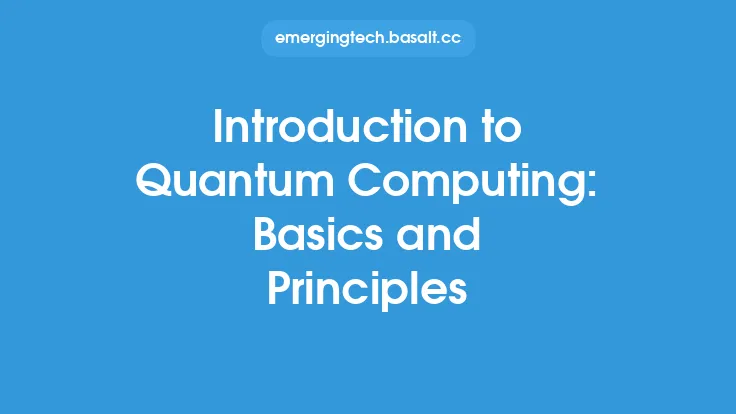Getting started with quantum computing can be a daunting task, especially for those without a background in physics or computer science. One of the main barriers to entry is the complex and often confusing terminology used in the field. Quantum computing has its own unique set of jargon, which can make it difficult for beginners to understand and communicate with experts. In this article, we will delve into the world of quantum computing terminology, exploring the key concepts, definitions, and phrases that you need to know to get started.
Introduction to Quantum Computing Terminology
Quantum computing terminology is a unique blend of physics, mathematics, and computer science. It includes terms such as superposition, entanglement, and wave function, which describe the behavior of quantum systems. Understanding these terms is crucial for working with quantum computers and developing quantum algorithms. Some of the key terms you'll encounter in quantum computing include:
- Qubit: a quantum bit, which is the fundamental unit of quantum information
- Quantum gate: a quantum operation that performs a specific task, such as adding or multiplying qubits
- Quantum circuit: a sequence of quantum gates that perform a specific computation
- Hilbert space: a mathematical space used to describe the behavior of quantum systems
- Density matrix: a mathematical representation of a quantum system's state
Quantum Computing Jargon: Key Concepts and Definitions
As you delve deeper into the world of quantum computing, you'll encounter a wide range of technical terms and phrases. Some of the key concepts and definitions you should know include:
- Coherence: the ability of a quantum system to exist in multiple states simultaneously
- Decoherence: the loss of coherence due to interactions with the environment
- Entanglement entropy: a measure of the amount of entanglement between two or more qubits
- Quantum noise: random fluctuations in a quantum system that can cause errors
- Quantum error correction: techniques used to detect and correct errors in quantum computations
- Quantum simulation: the use of a quantum computer to simulate the behavior of a quantum system
- Topological quantum computing: a type of quantum computing that uses exotic materials called topological insulators
Quantum Computing Paradigms and Models
There are several different paradigms and models used in quantum computing, each with its own unique terminology and jargon. Some of the most common include:
- Quantum circuit model: a model of quantum computing that uses a sequence of quantum gates to perform computations
- Topological quantum computing: a model of quantum computing that uses exotic materials called topological insulators
- Adiabatic quantum computing: a model of quantum computing that uses a slow and continuous process to perform computations
- Quantum annealing: a model of quantum computing that uses a process called annealing to find the minimum or maximum of a function
- Quantum machine learning: a model of quantum computing that uses machine learning algorithms to perform tasks such as classification and regression
Quantum Computing Hardware and Architecture
Quantum computing hardware and architecture are critical components of any quantum computing system. Some of the key terms and concepts you should know include:
- Quantum processor unit (QPU): the hardware component that performs quantum computations
- Quantum control electronics: the hardware component that controls the QPU and performs tasks such as quantum error correction
- Quantum software stack: the software component that manages the QPU and performs tasks such as quantum simulation and quantum machine learning
- Superconducting qubits: a type of qubit that uses superconducting materials to store and manipulate quantum information
- Ion trap quantum computing: a type of quantum computing that uses ions to store and manipulate quantum information
Quantum Computing Software and Programming
Quantum computing software and programming are essential for developing and running quantum algorithms. Some of the key terms and concepts you should know include:
- Quantum programming languages: languages such as Q# and Qiskit that are used to write quantum algorithms
- Quantum software development kits (SDKs): software kits that provide tools and libraries for developing quantum algorithms
- Quantum simulation software: software that simulates the behavior of quantum systems
- Quantum machine learning software: software that uses machine learning algorithms to perform tasks such as classification and regression
- Quantum debugging tools: tools that help developers debug and optimize their quantum algorithms
Conclusion
Quantum computing terminology and jargon can be complex and overwhelming, but understanding these concepts is essential for working with quantum computers and developing quantum algorithms. By familiarizing yourself with the key terms and concepts outlined in this article, you'll be well on your way to becoming proficient in the language of quantum computing. Whether you're a researcher, developer, or simply interested in learning more about this exciting field, mastering quantum computing terminology is a crucial step in unlocking the full potential of quantum computing.





